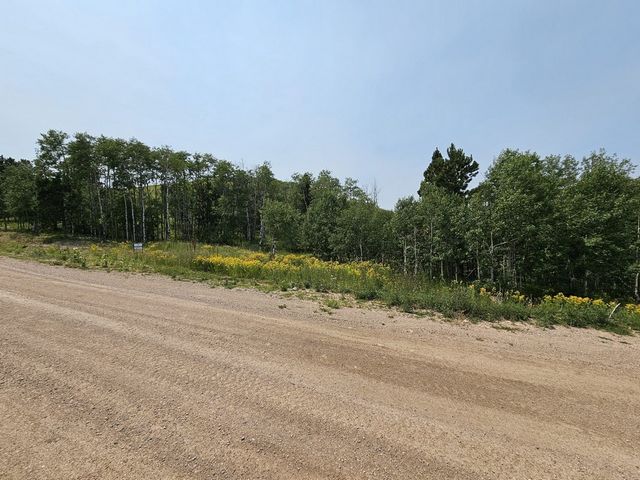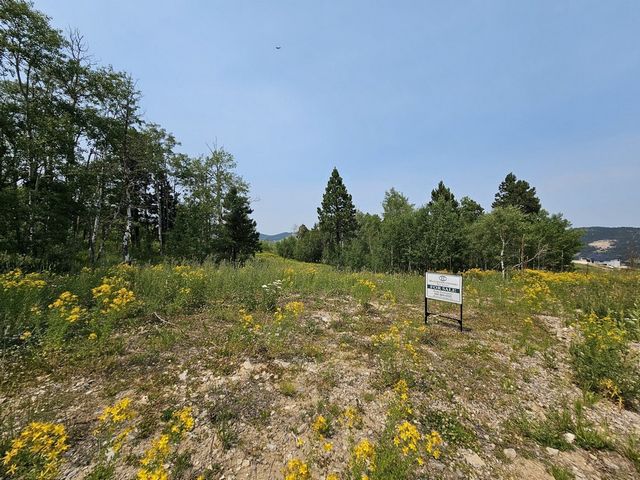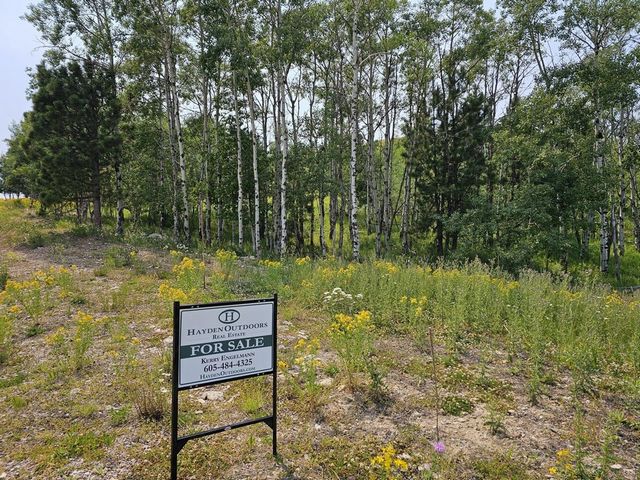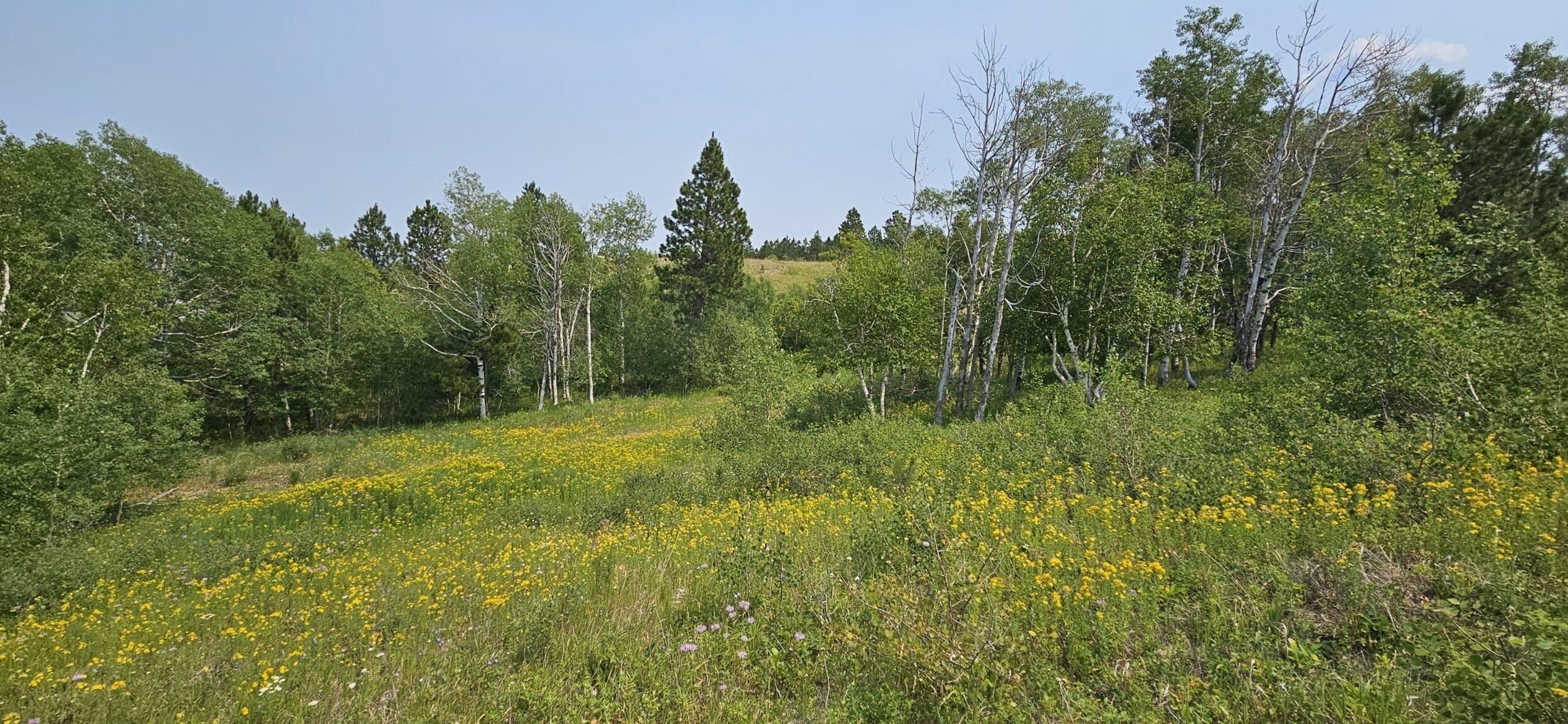299.618 EUR
DIE BILDER WERDEN GELADEN…
Häuser & einzelhäuser zum Verkauf in Sturgis
280.225 EUR
Häuser & Einzelhäuser (Zum Verkauf)
Grund 8.094 m²
Aktenzeichen:
EDEN-T100166811
/ 100166811
Nestled atop an iconic mountaintop in the majestic Black Hills of South Dakota, this 2.89 acre building site offers an unparalleled opportunity to create your dream residence or vacation getaway. Just minutes away from the vibrant downtown Deadwood, this property promises the perfect blend of seclusion and convenience, inviting you to experience the best of both worlds. This property offers the perfect canvas for your architectural masterpiece. Prepare to be captivated by 360-degree panoramic views that feature some of the most renowned landmarks in the area. Gaze upon the majestic Terry Peak, the spiritual Bear Butte, and the serene Orman Dam. Each view promises a unique and inspiring experience, changing with the seasons and time of day. The rear of this lot adjoins thousands of acres of BLM land, offering a serene backdrop and ensuring your view remains unspoiled. This proximity to protected land not only guarantees privacy but also provides direct access to a vast expanse of natural beauty, ideal for hiking, wildlife observation, and embracing the great outdoors. Water and electricity are to the lot line. The Black Hills, particularly the Deadwood area, offer a wide range of recreational opportunities that attract visitors year-round. The region's diverse landscape of forests, mountains, and rivers provides a perfect setting for various outdoor activities. Here's an overview of the recreational opportunities: Hiking and Biking Trails: The Black Hills are crisscrossed with numerous trails suitable for all levels of hikers and bikers. The George S. Mickelson Trail is particularly famous, stretching over 109 miles from Deadwood to Edgemont. It's a converted rail trail that passes through forests, alongside creeks, and offers stunning views of the surrounding landscape. Black Elk Peak: The highest point east of the Rocky Mountains, Black Elk Peak, offers a challenging hike with rewarding panoramic views at the summit. Camping The region has several campgrounds, ranging from primitive sites to more developed areas with amenities. Popular camping spots include Custer State Park, Spearfish Canyon, and various locations within the Black Hills National Forest. Backcountry camping is also an option for those seeking solitude and a closer connection with nature. Fishing & Boating Lakes and Reservoirs: The Black Hills are dotted with lakes and reservoirs, such as Pactola Lake, Sheridan Lake, and Deerfield Reservoir, where visitors can fish for trout, bass, and other species. These water bodies also offer opportunities for boating, kayaking, and paddle boarding. Streams and Rivers: The area's streams and rivers, like Spearfish Creek and Rapid Creek, are popular spots for fly fishing. Wildlife and Photography Custer State Park: A must-visit for wildlife enthusiasts, this park is home to a large herd of bison, as well as deer, elk, pronghorn, and a variety of bird species. The park's scenic drives, like the Wildlife Loop Road, provide ample opportunities to observe these animals in their natural habitat. The region's diverse landscapes also make it a prime location for nature photography, with opportunities to capture everything from sweeping vistas to close-up shots of wildlife. Rock Climbing The Black Hills, with its granite spires and cliffs, is a popular destination for rock climbing. Sylvan Lake and Needles Highway are well-known climbing spots, offering routes for both beginners and experienced climbers. Winter Sports Snowmobiling: The Black Hills have over 350 miles of groomed snowmobile trails, winding through forests and offering beautiful winter scenery. Skiing and Snowboarding: Terry Peak Ski Area near Deadwood is a popular destination for downhill skiing and snowboarding, with runs for all skill levels. Cross-Country Skiing and Snowshoeing: These activities are popular in the winter months, with many trails converted for cross-country skiing and snowshoeing. Historical & Cultural Attractions Deadwood: The town itself is a major attraction, offering a blend of Old West history and modern entertainment. Visitors can explore historic sites like the Adams Museum, Mount Moriah Cemetery (the final resting place of Wild Bill Hickok and Calamity Jane), and participate in reenactments of historic events. Gambling: Deadwood also offers a range of casinos and gaming establishments, making it a lively spot for those interested in nightlife. Scenic Drives Spearfish Canyon Scenic Byway: This drive is renowned for its stunning limestone cliffs, waterfalls, and vibrant autumn colors. Needles Highway and Iron Mountain Road: These drives offer dramatic views, including the famous Needles Eye rock formation and glimpses of Mount Rushmore. Horseback Riding Many outfitters in the area offer guided horseback riding tours, allowing visitors to explore the Black Hills as the early settlers did. ATV & Off-Roading The Black Hills National Forest offers numerous trails and roads open to ATV and off-road vehicle use, providing an adventurous way to explore the region's rugged terrain. Caving The Black Hills are home to several caves, including Jewel Cave National Monument and Wind Cave National Park. These caves offer guided tours that explore their intricate formations and underground passages. These diverse recreational opportunities make the Black Hills and the Deadwood area a year-round destination for outdoor enthusiasts, history buffs, and adventure seekers alike. The climate of the Black Hills, including the Deadwood area, is generally classified as a continental climate, but it is also influenced by the elevation and forested environment. Here's a breakdown of the climate characteristics: Seasons: The Black Hills experience all four seasons distinctly. Winters are cold and can be snowy, especially at higher elevations. Snowfall in Deadwood is common from late fall through early spring. Summers are warm, with temperatures typically ranging from the mid-70s to low 80s°F (24-28°C), though cooler temperatures prevail at higher elevations. Precipitation: The Black Hills receive more precipitation than the surrounding plains, due to orographic lift (where moist air is forced upward by the terrain, cooling and releasing moisture as rain or snow). Deadwood receives an average of about 28 inches (71 cm) of precipitation annually, with the majority falling as snow in the winter and rain in the spring and summer. Temperature: Due to the elevation (Deadwood sits around 4,500 feet or 1,370 meters above sea level), temperatures can be cooler compared to the surrounding plains. Winter temperatures often dip below freezing, while summer temperatures are mild to warm. Microclimates: The varied topography of the Black Hills creates numerous microclimates. Valleys and sheltered areas like Deadwood might experience milder conditions, while exposed peaks and ridges can be significantly cooler and windier. The history of the Black Hills and the Deadwood area is rich and deeply intertwined with the cultural, economic, and social developments of the American West. Understanding this history provides valuable context for anyone considering making this unique region their home. Indigenous Heritage Lakota Sioux: The Black Hills, known as Paha Sapa in Lakota, hold profound spiritual significance to the Lakota Sioux people. The area was considered sacred, with the Lakota believing it to be the center of their universe. The Black Hills were used for ceremonial purposes and were central to the cultural identity of the Lakota. The Gold Rush and Settlement Gold Discovery (1874): The discovery of gold in the Black Hills by the Custer Expedition in 1874 triggered a rush of miners and settlers to the area, despite it being designated as Sioux land. This influx led to the establishment of towns like Deadwood and Lead. Deadwood's Founding (1876): Deadwood became a boomtown almost overnight, attracting thousands of fortune seekers. The town quickly developed a reputation for lawlessness, with famous figures like Wild Bill Hickok, Calamity Jane, and Seth Bullock becoming part of its storied past. Wild Bill Hickok, famously shot while holding a hand of aces and eights, is buried in Deadwood's Mount Moriah Cemetery, along with other notable historical figures. Economic and Cultural Development Mining Industry: The initial gold rush gave way to more structured mining operations, with the Homestake Mine in Lead becoming one of the world's largest and most productive gold mines. The mine operated for over a century, contributing significantly to the local economy and shaping the development of the surrounding communities. Frontier Culture: The early days of Deadwood were marked by a blend of rugged frontier life and rapid development. Saloons, gambling halls, and brothels were common, giving the town its wild reputation. Over time, efforts were made to bring order to the town, with the establishment of law enforcement and civic institutions. Modern Times Preservation: As the mining boom waned, Deadwood transformed into a hub for tourism and historical preservation. In 1989, gambling was legalized in Deadwood, leading to a revitalization of the town and the preservation of many historic buildings. Tourism and Heritage: Today, Deadwood is a National Historic Landmark District, preserving its Wild West heritage while offering modern amenities and attractions. The town's rich history is a focal point for tourism, with numerous museums, historic sites, and reenactments drawing visitors from around the world. Living in the Black Hills Today Community and Culture: The Black Hills region, including Deadwood, has a strong sense of community. Residents often embrace the area's history and natural beauty, with a lifestyle that balances modern conveniences with a connection to the outdoors and a deep appreciation for the local heritage. Education and Healthcare: The area has access to quality education and healthcare facilities, with the nearby cities of Rapid City and Spearfish...
Mehr anzeigen
Weniger anzeigen
Nestled atop an iconic mountaintop in the majestic Black Hills of South Dakota, this 2.89 acre building site offers an unparalleled opportunity to create your dream residence or vacation getaway. Just minutes away from the vibrant downtown Deadwood, this property promises the perfect blend of seclusion and convenience, inviting you to experience the best of both worlds. This property offers the perfect canvas for your architectural masterpiece. Prepare to be captivated by 360-degree panoramic views that feature some of the most renowned landmarks in the area. Gaze upon the majestic Terry Peak, the spiritual Bear Butte, and the serene Orman Dam. Each view promises a unique and inspiring experience, changing with the seasons and time of day. The rear of this lot adjoins thousands of acres of BLM land, offering a serene backdrop and ensuring your view remains unspoiled. This proximity to protected land not only guarantees privacy but also provides direct access to a vast expanse of natural beauty, ideal for hiking, wildlife observation, and embracing the great outdoors. Water and electricity are to the lot line. The Black Hills, particularly the Deadwood area, offer a wide range of recreational opportunities that attract visitors year-round. The region's diverse landscape of forests, mountains, and rivers provides a perfect setting for various outdoor activities. Here's an overview of the recreational opportunities: Hiking and Biking Trails: The Black Hills are crisscrossed with numerous trails suitable for all levels of hikers and bikers. The George S. Mickelson Trail is particularly famous, stretching over 109 miles from Deadwood to Edgemont. It's a converted rail trail that passes through forests, alongside creeks, and offers stunning views of the surrounding landscape. Black Elk Peak: The highest point east of the Rocky Mountains, Black Elk Peak, offers a challenging hike with rewarding panoramic views at the summit. Camping The region has several campgrounds, ranging from primitive sites to more developed areas with amenities. Popular camping spots include Custer State Park, Spearfish Canyon, and various locations within the Black Hills National Forest. Backcountry camping is also an option for those seeking solitude and a closer connection with nature. Fishing & Boating Lakes and Reservoirs: The Black Hills are dotted with lakes and reservoirs, such as Pactola Lake, Sheridan Lake, and Deerfield Reservoir, where visitors can fish for trout, bass, and other species. These water bodies also offer opportunities for boating, kayaking, and paddle boarding. Streams and Rivers: The area's streams and rivers, like Spearfish Creek and Rapid Creek, are popular spots for fly fishing. Wildlife and Photography Custer State Park: A must-visit for wildlife enthusiasts, this park is home to a large herd of bison, as well as deer, elk, pronghorn, and a variety of bird species. The park's scenic drives, like the Wildlife Loop Road, provide ample opportunities to observe these animals in their natural habitat. The region's diverse landscapes also make it a prime location for nature photography, with opportunities to capture everything from sweeping vistas to close-up shots of wildlife. Rock Climbing The Black Hills, with its granite spires and cliffs, is a popular destination for rock climbing. Sylvan Lake and Needles Highway are well-known climbing spots, offering routes for both beginners and experienced climbers. Winter Sports Snowmobiling: The Black Hills have over 350 miles of groomed snowmobile trails, winding through forests and offering beautiful winter scenery. Skiing and Snowboarding: Terry Peak Ski Area near Deadwood is a popular destination for downhill skiing and snowboarding, with runs for all skill levels. Cross-Country Skiing and Snowshoeing: These activities are popular in the winter months, with many trails converted for cross-country skiing and snowshoeing. Historical & Cultural Attractions Deadwood: The town itself is a major attraction, offering a blend of Old West history and modern entertainment. Visitors can explore historic sites like the Adams Museum, Mount Moriah Cemetery (the final resting place of Wild Bill Hickok and Calamity Jane), and participate in reenactments of historic events. Gambling: Deadwood also offers a range of casinos and gaming establishments, making it a lively spot for those interested in nightlife. Scenic Drives Spearfish Canyon Scenic Byway: This drive is renowned for its stunning limestone cliffs, waterfalls, and vibrant autumn colors. Needles Highway and Iron Mountain Road: These drives offer dramatic views, including the famous Needles Eye rock formation and glimpses of Mount Rushmore. Horseback Riding Many outfitters in the area offer guided horseback riding tours, allowing visitors to explore the Black Hills as the early settlers did. ATV & Off-Roading The Black Hills National Forest offers numerous trails and roads open to ATV and off-road vehicle use, providing an adventurous way to explore the region's rugged terrain. Caving The Black Hills are home to several caves, including Jewel Cave National Monument and Wind Cave National Park. These caves offer guided tours that explore their intricate formations and underground passages. These diverse recreational opportunities make the Black Hills and the Deadwood area a year-round destination for outdoor enthusiasts, history buffs, and adventure seekers alike. The climate of the Black Hills, including the Deadwood area, is generally classified as a continental climate, but it is also influenced by the elevation and forested environment. Here's a breakdown of the climate characteristics: Seasons: The Black Hills experience all four seasons distinctly. Winters are cold and can be snowy, especially at higher elevations. Snowfall in Deadwood is common from late fall through early spring. Summers are warm, with temperatures typically ranging from the mid-70s to low 80s°F (24-28°C), though cooler temperatures prevail at higher elevations. Precipitation: The Black Hills receive more precipitation than the surrounding plains, due to orographic lift (where moist air is forced upward by the terrain, cooling and releasing moisture as rain or snow). Deadwood receives an average of about 28 inches (71 cm) of precipitation annually, with the majority falling as snow in the winter and rain in the spring and summer. Temperature: Due to the elevation (Deadwood sits around 4,500 feet or 1,370 meters above sea level), temperatures can be cooler compared to the surrounding plains. Winter temperatures often dip below freezing, while summer temperatures are mild to warm. Microclimates: The varied topography of the Black Hills creates numerous microclimates. Valleys and sheltered areas like Deadwood might experience milder conditions, while exposed peaks and ridges can be significantly cooler and windier. The history of the Black Hills and the Deadwood area is rich and deeply intertwined with the cultural, economic, and social developments of the American West. Understanding this history provides valuable context for anyone considering making this unique region their home. Indigenous Heritage Lakota Sioux: The Black Hills, known as Paha Sapa in Lakota, hold profound spiritual significance to the Lakota Sioux people. The area was considered sacred, with the Lakota believing it to be the center of their universe. The Black Hills were used for ceremonial purposes and were central to the cultural identity of the Lakota. The Gold Rush and Settlement Gold Discovery (1874): The discovery of gold in the Black Hills by the Custer Expedition in 1874 triggered a rush of miners and settlers to the area, despite it being designated as Sioux land. This influx led to the establishment of towns like Deadwood and Lead. Deadwood's Founding (1876): Deadwood became a boomtown almost overnight, attracting thousands of fortune seekers. The town quickly developed a reputation for lawlessness, with famous figures like Wild Bill Hickok, Calamity Jane, and Seth Bullock becoming part of its storied past. Wild Bill Hickok, famously shot while holding a hand of aces and eights, is buried in Deadwood's Mount Moriah Cemetery, along with other notable historical figures. Economic and Cultural Development Mining Industry: The initial gold rush gave way to more structured mining operations, with the Homestake Mine in Lead becoming one of the world's largest and most productive gold mines. The mine operated for over a century, contributing significantly to the local economy and shaping the development of the surrounding communities. Frontier Culture: The early days of Deadwood were marked by a blend of rugged frontier life and rapid development. Saloons, gambling halls, and brothels were common, giving the town its wild reputation. Over time, efforts were made to bring order to the town, with the establishment of law enforcement and civic institutions. Modern Times Preservation: As the mining boom waned, Deadwood transformed into a hub for tourism and historical preservation. In 1989, gambling was legalized in Deadwood, leading to a revitalization of the town and the preservation of many historic buildings. Tourism and Heritage: Today, Deadwood is a National Historic Landmark District, preserving its Wild West heritage while offering modern amenities and attractions. The town's rich history is a focal point for tourism, with numerous museums, historic sites, and reenactments drawing visitors from around the world. Living in the Black Hills Today Community and Culture: The Black Hills region, including Deadwood, has a strong sense of community. Residents often embrace the area's history and natural beauty, with a lifestyle that balances modern conveniences with a connection to the outdoors and a deep appreciation for the local heritage. Education and Healthcare: The area has access to quality education and healthcare facilities, with the nearby cities of Rapid City and Spearfish...
Aktenzeichen:
EDEN-T100166811
Land:
US
Stadt:
Sturgis
Postleitzahl:
57785
Kategorie:
Wohnsitze
Anzeigentyp:
Zum Verkauf
Immobilientyp:
Häuser & Einzelhäuser
Größe des Grundstücks:
8.094 m²











